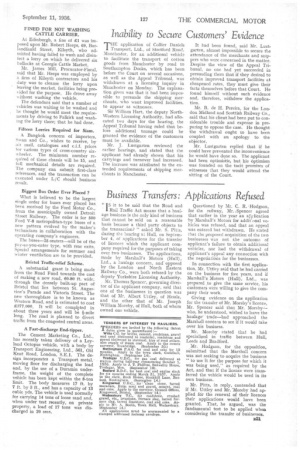Inability to Secure Customers' Evidence
Page 31

If you've noticed an error in this article please click here to report it so we can fix it.
THE application of Collier Daniels Transport, Ltd., of Stretford Road; Manchester, for an additional vehicle to facilitate the transport of cotton goods from Manchester by road to Southampton Docks, which has been before the Court on several occasions, as well as the Appeal Tribunal, was withdrawn at a licensing inquiry in Manchester on Monday. The explanation given was that it had been impossible to persuade the shipping merchants, who want improved facilities, to appear as witnesses.
Sir William Hart, the deputy NorthWestern Licensing Authority, had allocated two days for the hearing, the Appeal Tribunal having ruled that before additional tonnage could be granted the evidence of the customers must be available.
Mr. J. Lustgarten reviewed the earlier hearings, and stated that the applicant had already shown that his carryings and turnover had increased. The increase was attributed to the extended requirements of shipping merchants in Manchester. It had been found, said Mr. Lustgarten, almost impossible to secure the attendance of the merchants and shippers who were concerned in the matter. Despite the view of the Appeal Tribunal, no one had yet succeeded in persuading them that if they desired to obtain improved transport facilities at cheapened rates, they must give their facts themselves before that Court. He found himself without such evidence and, therefore, withdrew the application.
Mr. B. de H. Pereira, for the London Midland and Scottish Railway Co., said that his client had been put to considerable trouble and expense in preparing to oppose the case. He thought the withdrawal ought to have been coupled with an apology to the objector.
Mr. Lustgarten replied that if he could have prevented the inconvenience he would have done so. The applicant had been optimistic, but his 6ptimism was founded on the tacit promises of witnesses that they would attend the sitting of the Court.




















































































